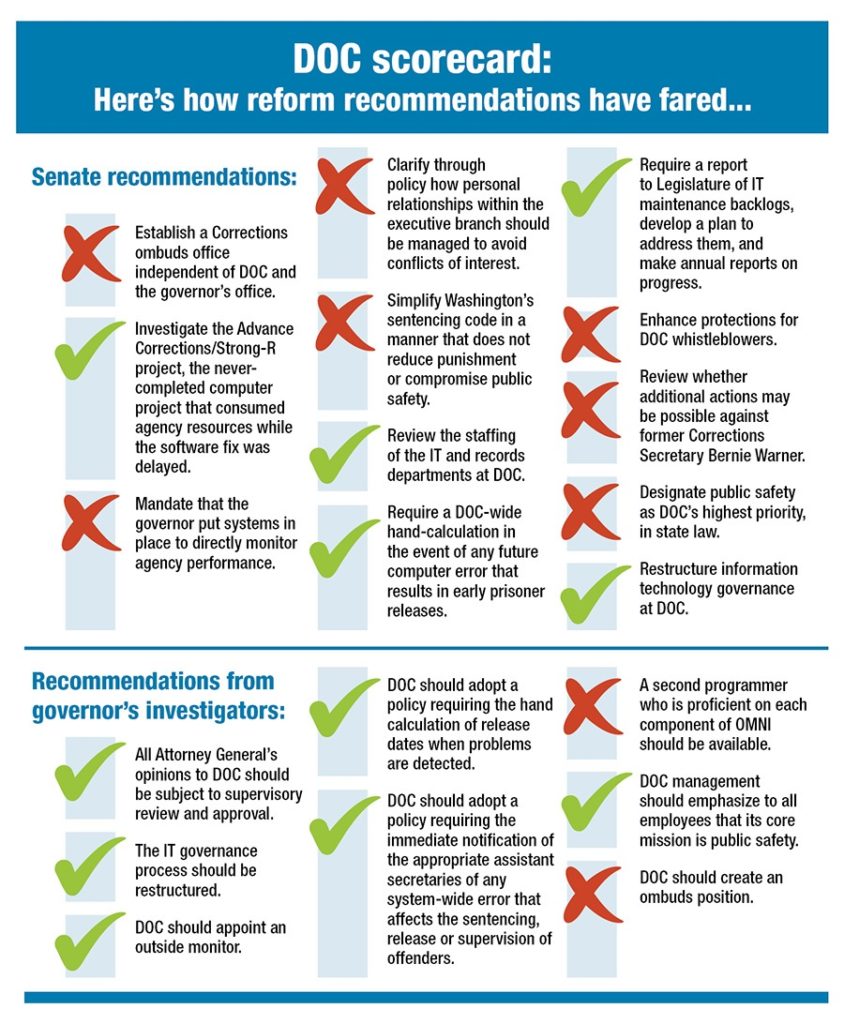The following newsletter was sent to subscribers to Sen. Padden’s newsletter, Feb. 28, 2019. To subscribe to Sen. Padden’s newsletters, click here.

Sen. Steve O’Ban, R-University Place, joins Sen. Padden for an interview with KIRO-TV about the latest prisoner releases. O’Ban and Padden led the Senate’s investigation into early releases in 2016.
A new round of prisoner releases points to continuing problems at Corrections
Dear Friends and Neighbors,
Over the last few days, we have learned that the Department of Corrections has discovered a new problem with the way its computers calculate sentences. What is most discouraging is that we could have prevented it with a bill we struggled mightily to pass in 2017.
Early this month, department officials informed lawmakers, including myself, of a minor problem involving a couple of inmates. We had to learn through the press that a staff of 50 is reviewing more than 3,000 cases to determine how many prisoners were released early or late. While this review is thoroughly warranted, once again we are forced to wonder about the agency’s management and culture.
Three years ago, a shocking case of Corrections mismanagement prompted a formal Senate investigation. Over a 13-year period, some 3,000 violent and dangerous felons were released early, because computers were programmed incorrectly and no one checked the math. Even worse, after Corrections was notified of the error, the early releases continued another three years before the software was fixed. Meanwhile, two people were killed by felons who should have been behind bars.
So far, this breach does not appear as serious as the last one. It involves a different group of inmates, those who were returned to prison for violating the terms of their community supervision. But it does involve the same computer system, and press accounts indicate programmers are having difficulty making the fix. It makes us wonder what might have been. Our investigation produced a series of recommendations, but our reform bill was quashed in the House when the governor’s office insisted it had everything under control. Suffice it to say we wouldn’t be in this position today if the bill had passed.
We’ll keep you posted as this story develops. As the saying goes, those who fail to learn from their mistakes are doomed to repeat them. Not that there is any satisfaction in saying “told you so.” Only dismay.
Sincerely,
Senator Mike Padden
The road not taken:
Corrections reforms left undone
This chart from 2017 shows just how many recommendations for reform in the wake of the last sentencing scandal were left undone. Although some recommendations were implemented, others offered by the Senate and the governor’s own investigatory team were cast aside when pressure from the governor’s office led the House to take no action on our reform bill. Last year an ombuds program was established. Unfortunately, it is not an independent office as originally envisioned — it is controlled by the governor — and it serves only inmates and their families, not the front-line employees of the Department of Corrections who are most cognizant of management problems within the agency.
Vaccinations, gun control dominate local concerns
Let’s look at a couple of issues that are dominating the emails and legislative-hotline messages we’re getting from the 4th Legislative District.
Vaccinations – One of the hottest topics in the Legislature right now is Senate Bill 5841, which would make the state’s vaccination rules more stringent. State law says unvaccinated children cannot attend schools or daycare facilities, but parents and guardians can exempt their children if they submit signed statements expressing a philosophical or personal objection. Under the bill, the only permissible objection would be for medical reasons – and that requires a signed note from a doctor or other health care practicioner. The bill awaits action on the Senate floor.
I am opposed to this legislation. Certainly there are good reasons for vaccination. Yet we also should recognize parental concerns about adverse reactions and the effect of combined vaccinations for multiple diseases. The concerns we are hearing about outbreaks of preventable diseases appear to be exaggerated – certainly we have lived with these rules for many years. People deserve the right to choose what is injected into their own bodies, one of the most personal decisions imaginable. We should not take this decision away from parents.
Gun restrictions – As always, we are confronted this year with new proposals to restrict ownership and use of firearms. This session the leading gun-control proposals are:
- SB 5062, which would ban the sale of magazines holding more than 10 rounds.
- SB 5061, which would prohibit the manufacture, sale and possession of so-called “undetectable” and untraceable firearms.
- SB 5174, which would require applicants for concealed pistol licenses to provide proof they have completed a firearms safety training program in the last five years.
All three of these bills await action on the Senate floor, yet none of them address the real concern of recent years – school shootings and other such horrific incidents in which the innocent are targeted by the deranged. For these people, the law has no meaning. Proposals such as these subject the law-abiding to suspicion, and restrict their ability to exercise their constitutional right to keep and bear arms. Does anyone really think that limiting the sale of certain types of weapons and enacting new licensing requirements will prevent a problem more related to the human condition?
We should recognize this as a mental health problem and put our emphasis on identifying vulnerable individuals. We should strengthen school safety programs and other measures that provide an effective response to incidents of violence. One such proposal is SB 5514, which is poised for action on the Senate floor. But most of all, we should resist the temptation to pass legislation that fails to address the problem, and restricts the rights of law-abiding gun owners.
‘An historic day in a bad way’

The most fiery debate so far this session erupted Wednesday over a bill that would mandate a sex-education curriculum starting in kindergarten. The measure, which would force urban Seattle values on public schools across the state, was passed on a caucus-line vote, 28-21. To see floor speech, click here.
A challenge to ‘Three Strikes’
One of the most popular anti-crime measures of all time is under attack, and it raises the question – are people as concerned about crime today as they once were? Majority Democrats in the Senate think not, and are working to turn back the “Three Strikes You’re Out” initiative approved by Washington voters in 1993. This measure, like similar laws in other states, imposes mandatory sentences of life-without-parole for offenders on their third conviction for violent crime. There was no doubt where the people stood on this one — 76 percent voted yes.
Two bills awaiting action in the Senate would whittle away at this measure. Senate Bill 5288 would eliminate second-degree robbery from the list of “Three Strikes” offenses, on the ground that it was added by the Legislature after the initiative was passed. Senate Bill 5819 would create a “Postconviction Review Board” to review the conduct of inmates after they have served 15 consecutive years, with the idea that inmates demonstrating good behavior might be released.
Advocates of these measures are correct in observing that crime rates have declined since the 1990s. But they ignore the deterrent effect of Three Strikes. The law is hard, fast and simple. A third strike means a lifetime in a prison jumpsuit, no exceptions. Our phones may not be ringing on this issue as they do on guns and vaccinations, but those of us who recall the furor that led to the passage of the initiative know this issue touches people just as deeply. Lawmakers who fret about the costs of imprisonment should recognize the very real human costs that crime imposes on its victims. Justice for crime victims should be our first priority.
Senate approves mediation bill
Disagreements are to be expected in politics, but when elected county officials can’t resolve their differences and begin suing one another, it’s time for a more measured approach. The Senate this week approved a bill I have sponsored requiring mediation before county officials go to court. SB 5560 applies to commissioners, county councilmembers, elected county officers and judges. Mediation allows tempers to cool, and could avoid costly and time-consuming lawsuits that give government a bad name.
In the News:
Five sexually violent predators now live under one roof in Spokane

To see video, click here.
A recent report on KXLY-TV reveals that five violent sex predators are being housed in a home in central Spokane, while they receive continued treatment in state-sanctioned programs. Though these predators are required to register as sex offenders, police are not informed of their special status, and no notification is required if they violate the terms of their release. We will have to watch this situation carefully — a change to our laws should be in order.
Contact us!
We’re in Olympia for the duration. If you have a question or concern about state government, please do not hesitate to contact our office. We are here to serve you!
Phone: (360) 786-7606
Street address: 106 Irv Newhouse Building, Capitol Campus, Olympia, WA 98504
Postal address: PO Box 40404, Olympia, WA 98504
Email address: Mike.Padden@leg.wa.gov













